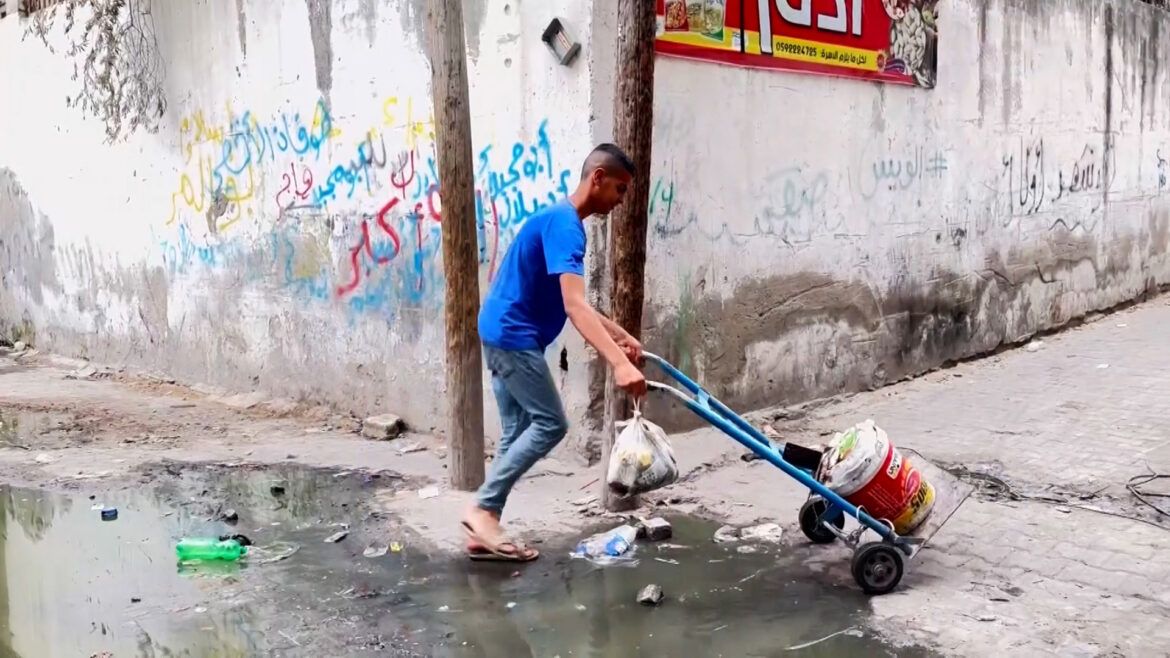WHO Regional Director Hanan Balkhi said Tuesday that some Gazans are forced to drink sewage and eat animal feed, calling for immediate increase in aid access to the besieged Strip.
Balkhi, Regional Director for the Eastern Mediterranean at the World Health Organization, also warned that the Israeli aggression on Gaza had an indirect impact on health care throughout the region.
The child health expert confirmed in an interview with Agence France-Presse in Geneva that what is happening will have serious and continuing effects on children.
She added that within the Strip, “there are people who now eat animal food, eat grass, and drink sewage.”
She explained, “The children barely get food, while the trucks stop outside Rafah.”
Deteriorating conditions
The United Nations warns that famine is looming in Gaza, where 1.1 million people, nearly half the population, face catastrophic levels of food insecurity.
The UN Office for the Coordination of Humanitarian Affairs said on Tuesday that restrictions on aid entry “continue to undermine the safe delivery of life-saving humanitarian assistance across Gaza” and that conditions “deteriorated further” in May. A small amount of aid enters mainly through the Kerem Shalom crossing with Israel.
According to Balkhi, who took office last February, the Gaza Strip needs “peace, peace, peace,” in addition to a significant increase in aid access by land.
After a recent visit to the Rafah crossing from Egypt into the southern Gaza Strip – a vital aid corridor that was closed by Israeli forces early last month – she urged Israel to “open that border.”
She pointed out that Kerem Shalom is “not enough,” and that efforts in sea lanes and airdrops are no longer logical in light of the presence of less expensive and more effective land routes and “trucks lining up” outside of them.
Balkhi expressed her dissatisfaction in particular with the ban on medical equipment considered “dual-use,” which Israel says can be used for military purposes.
“We are talking about artificial respirators and chemicals to purify clean water,” Balkhi said.
Children’s mental health
Balkhi stressed the urgent needs of patients in Gaza, where up to 11,000 sick and wounded people in critical condition require medical evacuation.
“The patients who are being discharged have some very complex injuries: multiple fractures, multidrug-resistant bacteria, and children with major deformities,” she said.
According to Balkhi, “In order to rehabilitate and treat such people, you need very complex health care,” noting the enormous pressure on the fragile health systems in neighboring host countries, especially Egypt.
Last week, the World Health Organization warned of a “sudden halt” in medical evacuations since Israel launched its attack on Rafah in early May and warned that more people would die while waiting for care.
Balkhi, a pediatrician specializing in infectious diseases, spoke about the short- and long-term effects of conflict on children.
Post-traumatic stress disorder
She explained that the war had had a devastating impact on basic public health measures, such as clean water, healthy food and routine immunizations, leaving children vulnerable to measles, chicken pox, diarrhea and respiratory diseases.
She noted, “It will have a major impact on mental health. This will cause major syndromes of post-traumatic stress disorder.”
“I think (for) the children who heard the bombing and the destruction and lived through that, it will take a lot of effort to get them out” of the shock, she added.
Regarding the children who were rescued from under the rubble, she noted, “I don’t even know how a person recovers from that psychologically.”
Regarding the possibility of rebuilding the destroyed health system in Gaza one day, Balkhi stressed that “donors’ ambition is high. But without peace, it is impossible.”



